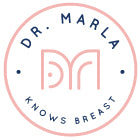Breast Cancer Statistics
Why should you care about your breast cancer risk? Because. All women are at risk.
Specifically for breast cancer, data from 2022 informs us that:
• 1 in 8 U.S. women (12.5%) will develop invasive breast cancer during their lifetime
• 287, 850 new cases invasive breast cancer will be diagnosed in women
If you were born a female and if you still have breast tissue, then unfortunately you are at risk for breast cancer and the risk increases as we age. Even Katie Couric was surprised by her diagnosis even though the high risk of breast cancer for women if from the age of 65-75.
A study by Brigham and Women's Hospital noted that the incidence of early onset cancers (those diagnosed before age 50), including cancers of the breast, has dramatically increased around the world. The early onset is associated with increased alcohol consumption, sleep deprivation, smoking, obesity, eating highly processed foods, sugary beverages, Type 2 diabetes, and sedentary lifestyle.
Absolute risk of breast cancer in U.S. women by age
From birth to age: Absolute risk of developing breast cancer is:
30 1 in 1,000 (0.1%)
40 1 in 167 (0.6%)
50 1 in 48 (2.1%)
60 1 in 23 (4.3%)
70 1 in 14 (7.4%)
80 1 in 9 (10.7%)
90 1 in 8 (12.5%)
Lifetime risk 1 in 8 (12.9%)
Source: 2016-2018 SEER data, 2021 [658]/Adapted from Susan G. Komen
Are you aware that we all have small cancerous tumors in our bodies called microtumors. Studies show that lifestyle and nutrition have a direct effect on whether these tumors are eliminated or develop into a clinically significant cancer.
A study by Folkman and Kalluri noted that for autopsies of women ages 40-50, 30% harbored non-clinical early breast cancer.
We are ALL at significant risk.
Our health remains our most valuable commodity. Without our health, we are unable to fully enjoy life. And the health issue that causes the most anxiety and worry is the diagnosis of cancer. The big C. The news can feel devastating, can be devastating, like a death sentence. Like we have no control over life, disease, and outcome.
The diagnosis of cancer leaves patients feeling vulnerable, filled with anxiety, fear, anger, sadness, disbelief, and a loss of control. The diagnosis of cancer can be overwhelming. Fortunately, with lifestyle changes and choices, you gain control over your risk!
Surveys show that many people misunderstand cancer risk. Many believe family history and genetic mutation account for most of the risk, but, in reality, ONLY 5-10% of cancers are a result of familial risk or inherited genetic mutation. That means that fully 90-95% of cancers are related non-genetic factors like lifestyle choices and environment!
Studies show that approximately 42% of total cancer cases and 45% of cancer deaths in the United States are linked to lifestyle related risk factors, and, according to WHO, between 30-50% of all cancer cases are preventable, being caused by lifestyle choices and environment. This means you can significantly influence your cancer risk, for better or worse, by the choices you make.
So, 1 in 3 of people living in the US will have a diagnosis of cancer in their lifetime. 1 in 3! What happened? An abundance of evidence suggests that lifestyle factors including toxin exposure, the standard Western diet full of processed food, emotional stress, unhealthy fats, and refined sugar, smoking, and physical inactivity account for most cancer diagnoses.
The same trends are seen around the world where breast cancer incidence is on the rise where the consumption of processed food, emotional stress, and physical inactivity due to our modern lifestyle is on the rise.
For example, cancer incidence has been shown to increase dramatically in both Japanese and African populations who immigrate to Western countries, the increase being linked to the adoption of a Western diet.

We have benefitted in innumerable ways from the industrial revolution, including the area of health from vaccines to modern medicine. But it has also shifted our health. Despite all the advances in medicine, our risk for developing cancer is the highest it has ever been.
From new and ubiquitous chemicals and plastics in our modern world that infiltrate every aspect of our life, our fast-paced lifestyle, and reliance of processed food, it is not surprising to see the current cancer statistics.
For many people it takes a cancer diagnosis to stop, reassess habits and choices, and start living life with eyes wide open. Many of my patients diagnosed with cancer tell me it is a “wake up call” to look at their lifestyle choices and try to live a healthier life.
By making healthy lifestyle choices now, you will ensure your best chance for never hearing the words “you have cancer” or, if you’ve had a cancer diagnosis, optimizing your outcomes, and minimizing recurrence going forward.

